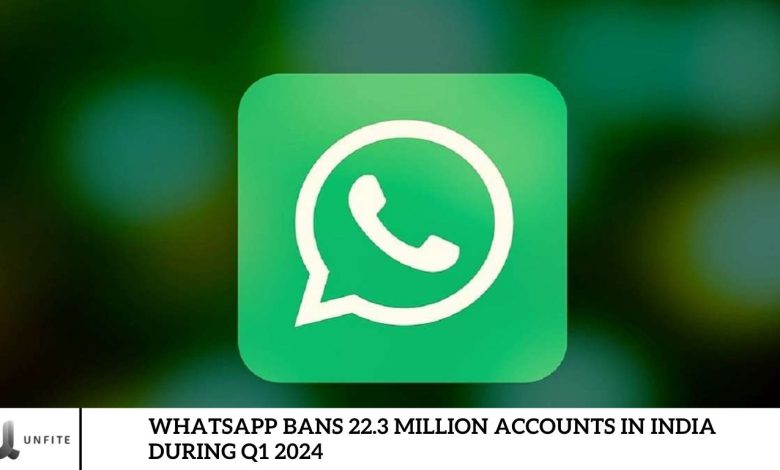WhatsApp Bans 22.3 Million Accounts in India During Q1 2024

WhatsApp decisively took action against many accounts in India, banning 22,310,000 accounts involved in online scams and fraud. This sweeping ban underscores the growing threat of online fraud and its impact on user safety. To understand the motivations behind WhatsApp’s significant crackdown, let’s examine this move’s underlying reasons and implications.
WhatsApp banned 22.3 million accounts in India in Q1 2024
In the first quarter of 2024, WhatsApp implemented a historic ban on over 223 million accounts in India, doubling the number banned during the same period in 2023. This substantial increase reflects growing concerns over online fraud and user security in the country.
User complaints prompted the bans, WhatsApp’s detection of suspicious activities by WhatsApp’s systems, and violations of Indian laws and WhatsApp’s policies. Additionally, these actions were carried out in compliance with directives from the Grievance Appellate Committee (GAC).
WhatsApp stated that the Government of India enforced Rule 4(1)(d) and Rule 3A(7) of the “Information Technology (Intermediary Guidelines and Digital Media Ethics Code) Rules, 2021” to facilitate these bans.
WhatsApp Release their monthly Report regarding banned accounts
According to WhatsApp’s Q1 2024 report, there has been a consistent increase in banned accounts each month.
WhatsApp banned over 6.7 million accounts in January, with roughly 1.3 million removed without user complaints. February saw a similar trend, with 7.6 million accounts banned, including more than 1.4 million flagged by the platform’s security systems.
The trend continued in March, with approximately 8 million accounts banned and over 1.4 million active before being removed.
These figures reflect WhatsApp’s ongoing commitment to combating misuse and its proactive approach to detecting and addressing violations. The platform’s monthly enforcement efforts underscore its dedication to maintaining user security and preventing fraudulent activities.
Why did WhatsApp Decide to Ban Accounts?
WhatsApp has banned accounts that violated its policies and threatened user privacy by engaging in fraudulent or spam activities. This significant action highlights a growing issue of platform misuse, especially in India, with over 530 million active WhatsApp users.
As part of Meta, WhatsApp encourages users to review and adhere to its acceptable use guidelines. In addition to focusing on account security, users should promptly report any instances of unauthorized access.
Since WhatsApp has banned up to 22.3 million accounts in India, users must take responsibility for their account security. Implementing measures to protect against scams and unauthorized access is essential for safeguarding your account.
The Scale of WhatsApp’s Q1 2024 Account Ban

Record-Breaking Numbers: 22.3 Million Accounts Banned
Unprecedented Scale of the Ban
In the first quarter of 2024, WhatsApp achieved a record-setting enforcement action by banning 22.3 million accounts in India. This massive scale of account suspension represents an unprecedented level of intervention by the platform, highlighting a significant shift in its approach to maintaining user safety and combating misuse.
Comparison with Previous Quarters and Annual Figures
To put this in perspective, the number of banned accounts in Q1 2024 is more than double the total bans recorded in the same period of the previous year. In Q1 2023, WhatsApp banned approximately 10.5 million accounts in India, significantly increasing enforcement efforts.
Over 2023, WhatsApp banned around 40 million accounts globally, with a substantial portion attributed to Indian users. The Q1 2024 figures alone have nearly surpassed the total number of bans for the previous year, indicating a dramatic escalation in the platform’s efforts to address online threats and fraudulent activities.
This sharp increase underscores WhatsApp’s growing challenges in managing and securing its vast user base and reflects a broader trend toward more rigorous account monitoring and enforcement.
Reasons Behind the Massive Ban
Combatting Fraud and Spam: The Key Drivers
Primary Reasons for Account Bans
WhatsApp’s decision to ban 22.3 million accounts in Q1 2024 primarily addresses the rising concerns of fraud and spam. The platform has identified several key issues driving this massive enforcement action:
- Fraudulent Activities: Many banned accounts were involved in fraudulent schemes designed to deceive users for financial gain. This includes phishing scams, fake lottery notifications, and other deceptive practices to steal personal information or money from unsuspecting users.
- Spam and Unsolicited Messages: Many banned accounts were associated with spam operations. These accounts flooded users with unsolicited and often malicious messages, including marketing spam, misleading advertisements, and harmful links that could compromise user security.
- Impersonation and Misrepresentation: Some accounts were banned for impersonating legitimate entities or individuals. These deceptive practices can undermine trust in the platform and facilitate further scams or fraudulent activities.
Compliance with Regulatory Directives
Adherence to Indian Regulations and Policies
WhatsApp’s extensive banning of accounts aligns with its commitment to comply with Indian regulatory requirements. The platform has taken the following steps to ensure adherence to local laws:
- Compliance with Rule 4(1)(d) and Rule 3A(7): WhatsApp has enforced these rules under the “Information Technology (Intermediary Guidelines and Digital Media Ethics Code) Rules, 2021,” which mandate stricter measures for addressing harmful content and user safety. Rule 4(1)(d) requires intermediaries to take appropriate actions against illegal content, while Rule 3A(7) emphasizes the need for proactive content moderation and user protection.
- Alignment with Grievance Appellate Committee (GAC) Directives: WhatsApp’s actions also reflect its adherence to directives from the Grievance Appellate Committee. This regulatory body oversees the enforcement of user protection measures and ensures that platforms like WhatsApp take necessary steps to address complaints and issues related to user security.
- Enhanced Reporting and Transparency: In response to regulatory pressures, WhatsApp has strengthened its reporting mechanisms and transparency in handling user grievances and content moderation. This includes detailed reporting on account bans and proactive measures to address violations.
Impact on WhatsApp Users in India
Addressing the Rise in Online Fraud
Analyzing the Increase in Fraud and Its Impact on Users
The recent surge in online fraud has become a significant concern for WhatsApp and its users. The platform’s Q1 2024 report reveals a dramatic rise in fraudulent activities, posing significant user security risks. Here’s an analysis of the trends:
- Increasing Sophistication of Scams: Fraudulent schemes have become more sophisticated, making it harder for users to distinguish between legitimate and deceptive messages. Scammers now employ advanced techniques such as phishing, fake investment opportunities, and identity theft, which have led to more significant financial losses and privacy breaches for users.
- Impact on Users: The rise in fraud has resulted in considerable harm to individuals, including financial losses, identity theft, and emotional distress. Victims of fraud may experience long-term consequences, such as damaged credit scores and personal security concerns. Additionally, the prevalence of scams undermines trust in the platform, affecting the overall user experience.
- Platform Vulnerability: With over 53 crore active users in India, the large user base makes WhatsApp an attractive target for fraudsters. The sheer volume of users increases the challenge of promptly detecting and mitigating fraudulent activities.
Enhancing User Safety: What This Means for You
Detailing the Measures WhatsApp Is Taking to Protect User Privacy
To counteract the rise in online fraud and to improve user safety, WhatsApp has implemented several key measures:
- Advanced Detection Systems: WhatsApp utilizes sophisticated algorithms and machine learning models to identify and flag suspicious activities. These systems analyze behavior patterns and content to detect potential fraud and spam, allowing quicker action against violators.
- Proactive Account Monitoring: The platform continuously monitors accounts for unusual activity. This includes tracking bulk messaging, rapid account creation, and other indicators that may suggest fraudulent behavior. By identifying these patterns early, WhatsApp can take preventive measures to mitigate risks.
- Enhanced Reporting Mechanisms: WhatsApp encourages users to report any suspicious or harmful content directly through the App. The platform has streamlined its reporting process, making it easier for users to flag problematic accounts or messages. This user-driven approach helps WhatsApp respond more effectively to emerging threats.
- Educational Resources and Alerts: WhatsApp provides educational resources to help users recognize and avoid common scams. The platform also sends alerts and notifications about potential security threats, keeping users informed and vigilant against fraud.
- More robust Privacy Controls: WhatsApp has introduced additional privacy settings to give users more control over who can see and interact with their personal information. These options include managing who can view their profile, status, and last-seen information.
Best Practices for WhatsApp Users

How to Safeguard Your Account
Tips for Users to Protect Their Accounts from Being Banned or Compromised
- Use Strong, Unique Passwords: Create a robust and unique password for your WhatsApp account and avoid using the same password across multiple platforms. A strong password should include letters, numbers, and special characters.
- Enable Two-Step Verification: Activate two-step verification for an added layer of security. This feature requires a verification code and password, making it harder for unauthorized individuals to access your account to access your account.
- Be Cautious with Links and Attachments: Avoid clicking suspicious links or downloading attachments from unknown sources. Scammers often use these methods to spread malware or phishing attempts.
- Regularly Review App Permissions: Check and manage app permissions to ensure that WhatsApp and other apps can only access the necessary information. Revoke permissions for any apps that you no longer use or trust.
- Monitor Account Activity: Monitor your account activity for any unusual behavior. If you notice any suspicious activity, such as unauthorized logins or unexpected changes, take immediate action to secure your account.
- Update the App Regularly: Ensure you are using the latest version of WhatsApp. Updates often include security patches that protect against newly discovered vulnerabilities.
- Avoid Using Third-Party Apps: Refrain from using unofficial or third-party apps that claim to enhance WhatsApp’s functionality. These apps can compromise your account security and lead to potential bans.
- Educate Yourself About Common Scams: Stay informed about common scams and fraudulent activities to recognize and avoid them. WhatsApp frequently updates its security guidelines and best practices.
Reporting Suspicious Activities
Guide on How to Report Issues to WhatsApp Effectively
In-App Reporting:
- For Individual Chats: Open the chat with the suspicious contact, tap on the contact’s name or number at the top of the screen, scroll down, and select “Report Contact.” Follow the prompts to provide details about the issue.
- For Groups: Open the group chat, tap on the group name at the top, scroll down, and choose “Report Group.” Select the appropriate reason and provide any additional information if required.
Reporting Spam or Fraudulent Messages:
- For Messages: If you receive a spam or fraudulent message, long-press on the message, tap the three-dot menu, and select “Report.” You can then choose the reason for reporting and submit your Report.
Contacting WhatsApp Support:
- Email WhatsApp support at support@whatsapp.com with detailed information about the issue. Include any relevant screenshots or evidence to help with the investigation.
- Through the App: Go to Settings > Help > Contact Us. Describe the issue in detail and attach any supporting documents if necessary. Submit your Report for review.
Follow Up:
- Track Your Report: After reporting, watch any follow-up messages or updates from WhatsApp. They may reach out for more information or provide updates on the resolution of your Report.
Provide Accurate Information:
- Detail the Issue: When reporting, provide as much detail as possible about the suspicious activity or account. Accurate and comprehensive information helps WhatsApp address the problem more effectively.
Frequently Asked Question
Why did WhatsApp ban 22.3 million accounts in India during Q1 2024?
WhatsApp banned these accounts primarily to combat rising fraud and spam on its platform. To ensure a safer user environment, the bans targeted accounts involved in fraudulent activities, spam distribution, and violations of WhatsApp’s policies.
How does WhatsApp identify accounts for banning?
WhatsApp uses advanced algorithms and machine learning to detect suspicious activities and patterns. The platform also relies on user reports and automated systems to identify accounts engaged in spam or fraudulent behavior.
What types of activities led to the banning of these accounts?
The banned accounts were involved in phishing scams, spam messaging, fraudulent schemes, and impersonation. These activities posed risks to user privacy and safety, prompting WhatsApp to take action.
How does the ban impact the affected users?
Affected users lose access to their WhatsApp accounts and any associated data. They may also experience disruptions in their communication channels and potentially lose essential messages or contacts.
Can ban users appeal the decision?
Users can appeal the ban if they believe it was a mistake. They should contact WhatsApp’s support team through the App or email to request a review of their case. Providing evidence and details can help in the appeal process.
What steps can users take to prevent their accounts from being banned?
Users should adhere to WhatsApp’s guidelines, avoid spam or fraud, use strong passwords, enable two-step verification, and report suspicious activities to WhatsApp.
How does WhatsApp ensure compliance with Indian regulations?
WhatsApp follows Indian regulations, including the “Information Technology (Intermediary Guidelines and Digital Media Ethics Code) Rules, 2021.” The platform follows directives from regulatory bodies and implements measures to comply with local laws.
How frequently does WhatsApp review and ban accounts?
WhatsApp regularly reviews accounts and uses automated systems to monitor suspicious behavior. The platform takes action as needed based on detected violations and user reports.
Conclusion
The banning of 22.3 million WhatsApp accounts in India during the first quarter of 2024 underscores the platform’s intensified efforts to combat fraud and enhance user security. This unprecedented action reflects a growing commitment to addressing the rising threats of online scams, spam, and malicious activities that compromise user safety and trust.
WhatsApp’s proactive measures, including advanced detection systems and compliance with regulatory directives, highlight its dedication to maintaining a secure and reliable communication environment. By targeting accounts engaged in harmful activities, the platform aims to protect its vast user base from potential threats and ensure a safer online experience.




